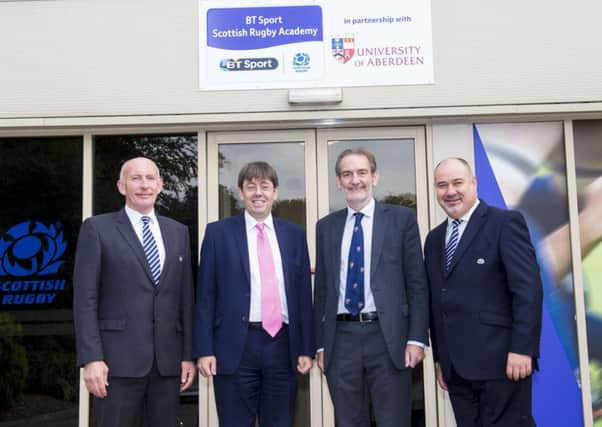Academies to reduce Scottish rugby imports - Dodson


In Aberdeen yesterday to launch the first of four academies, the SRU’s chief executive said that an increase in the number of high-quality domestic players would lessen the need for Edinburgh and Glasgow to recruit journeymen from abroad, and also free funds to be used on what he called “bling factor” signings – star names who could increase attendances at games.
“The reason we import players is either we have problems at the highest level in those positions, or we need squad depth for when our Scotland players are taken away, to stay competitive in the league,” Dodson said at the official opening of the BT Sport Scottish Rugby Academy at the University of Aberdeen’s Hillhead Campus. Other academies, at Riccarton in Edinburgh, Galashiels and Cumbernauld, are due to open over the next 12 months, with each one recruiting dozens of the best young players aged 14 and upwards from the area.
Advertisement
Hide AdAdvertisement
Hide Ad“If we’re producing homebred players of sufficient quality, you don’t need imported players to keep our pro teams competitive,” Dodson continued. “We’ll have Scottish players.
“And then we can sign outstanding foreigners to make a real big difference rather than just to make us competitive. That’s when you can go for the very highest level player like your Sam Burgesses or Sonny Bill Williams who bring the bling factor, who drive crowds and sales.
“Ulster had a lot of players coming through, then they signed three outstanding South Africans who added to their crowds. We’re criticised for signing good players, but not of the highest level. If this works, in quite short order, we should be able to change that policy.”
England’s Burgess and New Zealander Williams are both about to quit rugby league in Australia for rugby union, and are expected to feature prominently in next year’s Rugby World Cup. While that event will come round far too soon for the academy system to have an impact, Dodson is confident that the new system will provide the game with a broader base, populated by young players with a more solid grounding and professional outlook.
“There’s lots of things Scottish Rugby should have been doing over the last 15 years but we had different financial challenges. We’re now in the position, thanks to the BT deal, to bring to life several different initiatives.
“I’m delighted to be doing our first academy in Aberdeen. We’re bringing three more online. We need to have a pipeline for players to come through.
“We’ve had good players coming through across the whole country, but we’ve never had a bricks-and-mortar solution geographically that will allow someone to come through. We now have not just a process, but a building and a place where they can develop.
“The economics work on a split between four academies. You’ve got £1.2 million this year. We’re going to get four operational, up and running, by the end of September 2015.
Advertisement
Hide AdAdvertisement
Hide Ad“We’ve been really lucky here in Aberdeen that we’ve been given a facility that we are able to shape. What we’re also going to try to do is get other people to work with us – for example we’ve got North Lanarkshire Council working with us in Cumbernauld. We’re looking at people in the Borders and we’re also looking to do something with Heriot-Watt.
“We’ve got several people now who are talking to us about replicating what we’re doing here. So what we’ve done is create an idea and a vision, and people are buying into that vision and saying ‘We want to work with you in the same way that the University of Aberdeen is doing’.
“We’re recruiting boys and girls, and we’re going to go through from 14 – we’re going to try to take the very best kids at 14. They’ll all come out of this process as bigger, stronger and better players.
“We’d like to produce, say, a dozen high-quality players [per academy each year] then maybe another dozen who can go back into our game at domestic level.
“Every kid who has the desire and ability to play at elite level will be looked after. And we’ve got to be careful that we look after the late bloomer. Not every kid comes through at 14. Then at 18, 19 they’ll either go into our club system or go back into the domestic game.”
Stevie Gemmell, who was head coach to the Scotland Sevens squad at the Commonwealth Games, is acting head of the academy programme. He will liaise with head of women’s and girls’ rugby Sheila Begbie, national age-group coach Sean Lineen and director of rugby Scott Johnson, as well as working with a number of coaches who will be based at each of the academies.